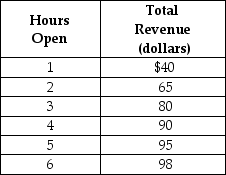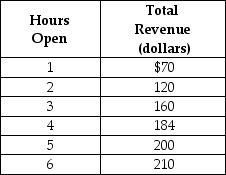Exam 1: Economics: Foundations and Models
Exam 1: Economics: Foundations and Models444 Questions
Exam 2: Trade-Offs, Comparative Advantage, and the Market System498 Questions
Exam 3: Where Prices Come From: the Interaction of Demand and Supply475 Questions
Exam 4: Economic Efficiency, Government Price Setting, and Taxes419 Questions
Exam 5: Externalities, Environmental Policy, and Public Goods266 Questions
Exam 6: Elasticity: the Responsiveness of Demand and Supply295 Questions
Exam 7: The Economics of Health Care334 Questions
Exam 8: Firms, the Stock Market, and Corporate Governance278 Questions
Exam 9: Comparative Advantage and the Gains From International Trade379 Questions
Exam 10: Consumer Choice and Behavioral Economics302 Questions
Exam 11: Technology, Production, and Costs330 Questions
Exam 12: Firms in Perfectly Competitive Markets298 Questions
Exam 13: Monopolistic Competition: the Competitive Model in a More Realistic Setting276 Questions
Exam 14: Oligopoly: Firms in Less Competitive Markets262 Questions
Exam 15: Monopoly and Antitrust Policy271 Questions
Exam 16: Pricing Strategy263 Questions
Exam 17: The Markets for Labor and Other Factors of Production286 Questions
Exam 18: Public Choice, Taxes, and the Distribution of Income258 Questions
Exam 19: GDP: Measuring Total Production and Income266 Questions
Exam 20: Unemployment and Inflation292 Questions
Exam 21: Economic Growth, the Financial System, and Business Cycles257 Questions
Exam 22: Long-Run Economic Growth: Sources and Policies268 Questions
Exam 23: Aggregate Expenditure and Output in the Short Run306 Questions
Exam 24: Aggregate Demand and Aggregate Supply Analysis284 Questions
Exam 25: Money, Banks, and the Federal Reserve System280 Questions
Exam 26: Monetary Policy277 Questions
Exam 27: Fiscal Policy303 Questions
Exam 28: Inflation, Unemployment, and Federal Reserve Policy257 Questions
Exam 29: Macroeconomics in an Open Economy278 Questions
Exam 30: The International Financial System262 Questions
Select questions type
What is a firm? What other terms do economists use interchangeably with the term "firm"?
(Essay)
4.9/5  (35)
(35)
Table 1-5
 Julius runs a small tailor shop in the city of Bloomfield. He is debating whether he should extend his hours of operation. Julius figures that his sales revenue will depend on the number of hours the tailor shop is open as shown in the table above. He would have to hire a worker for those hours at a wage rate of $18 per hour.
-Refer to Table 1-5. What is Julius's marginal cost if he decides to stay open for three hours instead of two hours?
Julius runs a small tailor shop in the city of Bloomfield. He is debating whether he should extend his hours of operation. Julius figures that his sales revenue will depend on the number of hours the tailor shop is open as shown in the table above. He would have to hire a worker for those hours at a wage rate of $18 per hour.
-Refer to Table 1-5. What is Julius's marginal cost if he decides to stay open for three hours instead of two hours?
(Multiple Choice)
4.8/5  (39)
(39)
Consider the following economic agents: a. the government
B. consumers
C. producers
Who, in a centrally planned economy, decides what goods and services will be produced with the scarce resources available in that economy?
(Multiple Choice)
4.8/5  (48)
(48)
DeShawn's Detailing is a service that details cars at the customers' homes or places of work. DeShawn's cost for a basic detailing package is $40, and he charges $75 for this service. For a total price of $90, DeShawn will also detail the car's engine, a service that adds an additional $20 to the total cost of the package. What is DeShawn's marginal benefit if he sells a basic detailing package?
(Multiple Choice)
4.9/5  (38)
(38)
What does the word "marginal" mean in economics? What is a marginal benefit? What is a marginal cost? What is marginal analysis?
(Essay)
4.8/5  (38)
(38)
Marginal cost is the ________ associated with undertaking an activity.
(Multiple Choice)
4.7/5  (33)
(33)
Suppose the extra cost for a doctor to keep his office open for one extra hour is $200. Then, the doctor should stay open for the extra hour even if he can generate additional revenue of $200 for that hour.
(True/False)
5.0/5  (40)
(40)
Consider the following statements: a. Consumers rent more DVDs from a video store that rents DVDs at a lower price than other rival video stores in the area.
B. Department stores take steps to increase security since they believe it is more costly to allow shoplifting than to install expensive security monitoring equipment.
C. Farmers produce more cotton when its selling price falls.
Which of the above statements demonstrates that economic agents respond to incentives?
(Multiple Choice)
4.8/5  (32)
(32)
When voluntary exchange takes place, neither party usually gains from the exchange.
(True/False)
4.8/5  (28)
(28)
Article Summary
In an August 2013 speech from the Lincoln Memorial, President Obama was expected to emphasize that increased economic equality is needed to improve racial equality. Economic gaps based on race have endured for 50 years, with the differences in unemployment rates between blacks and whites remaining virtually unchanged and the gap in wealth actually increasing. "If you look at 50 years after the 1960s civil rights movement, the most stubborn and persistent challenge when it comes to the nation's racial challenge remains in the areas of economics and wealth," said Marc Morial, president of the National Urban League.
Source: Zachary A. Goldfarb, "For Obama, 50 years after historic march, economic equality the path to racial justice," Washington Post, August 17, 2013.
-Refer to the Article Summary. The article mentions increased economic equality is needed in terms of wealth, and for some people this means a more equitable distribution of wealth. Would an equitable distribution of wealth necessarily be the most efficient distribution of wealth?
(Multiple Choice)
4.9/5  (34)
(34)
Scenario 1-3
Suppose a t-shirt manufacturer currently sells 5,000 t-shirts per week and makes a profit of $10,000 per week. A manager at the plant observes, "Although the last 400 t-shirts we produced and sold increased our revenue by $4,000 and our costs by $4,800, we are still making an overall profit of $10,000 per week so I think we're on the right track. We are producing the optimal number of t-shirts."
-Refer to Scenario 1-3. Using marginal analysis terminology, what is another economic term for the incremental revenue received from the sale of the last 400 t-shirts?
(Multiple Choice)
4.9/5  (29)
(29)
Article Summary
In an August 2013 speech from the Lincoln Memorial, President Obama was expected to emphasize that increased economic equality is needed to improve racial equality. Economic gaps based on race have endured for 50 years, with the differences in unemployment rates between blacks and whites remaining virtually unchanged and the gap in wealth actually increasing. "If you look at 50 years after the 1960s civil rights movement, the most stubborn and persistent challenge when it comes to the nation's racial challenge remains in the areas of economics and wealth," said Marc Morial, president of the National Urban League.
Source: Zachary A. Goldfarb, "For Obama, 50 years after historic march, economic equality the path to racial justice," Washington Post, August 17, 2013.
-Refer to the Article Summary. The article mentions increased economic equality is needed in terms of wealth. How would a more equal distribution of wealth differ from a more equitable distribution of wealth?
(Multiple Choice)
4.8/5  (32)
(32)
Table 1-3
 Santiago runs a comic book store in the town of East Arbor. He is debating whether he should extend his hours of operation. Santiago figures that his sales revenue will depend on the number of hours the store is open as shown in the table above. He would have to hire a worker for those hours at a wage rate of $18 per hour.
-Refer to Table 1-3. What is Santiago's marginal benefit if he decides to stay open for two hours instead of one hour?
Santiago runs a comic book store in the town of East Arbor. He is debating whether he should extend his hours of operation. Santiago figures that his sales revenue will depend on the number of hours the store is open as shown in the table above. He would have to hire a worker for those hours at a wage rate of $18 per hour.
-Refer to Table 1-3. What is Santiago's marginal benefit if he decides to stay open for two hours instead of one hour?
(Multiple Choice)
4.7/5  (40)
(40)
Suppose that to move more people off the wait list for organ donations, surgeons and hospitals are developing a market for organ swapping. This is an example of a macroeconomics topic.
(True/False)
4.7/5  (45)
(45)
All economic questions arise from the fact that resources are scarce.
(True/False)
4.9/5  (41)
(41)
According to the Centers for Disease Control and Prevention, ________ in 2013 in which less than 20 percent of the population was considered obese.
(Multiple Choice)
4.7/5  (41)
(41)
Showing 21 - 40 of 444
Filters
- Essay(0)
- Multiple Choice(0)
- Short Answer(0)
- True False(0)
- Matching(0)